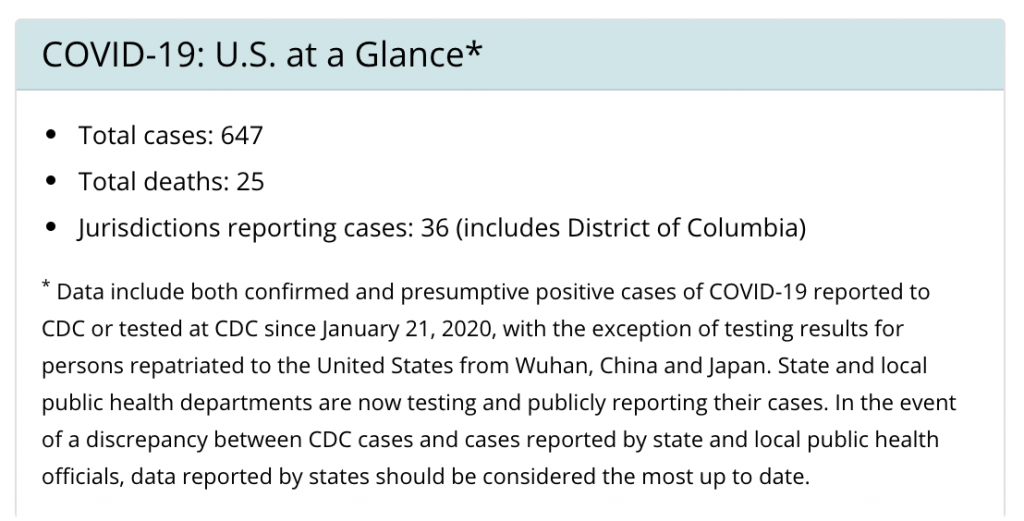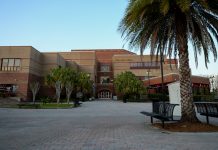
The Coronavirus Disease 2019 continues to rapidly evolve. Though COVID-19 has been around since the end of 2019, the virus is spreading and little research has been made public.
Most of the information that has been made public comes from the Centers for Disease Control and Prevention website and provides information on the number of people who have the Coronavirus, the amount who have died from the virus, what people can do to help themselves be less likely to get the virus and what is being done to help.
According to the CDC, COVID-19 has led to 647 total cases of the virus, and 25 deaths within 36 states, including the District of Columbia., at time of publication.

This data only includes those confirmed and presumptive positive cases of COVID-19 reported to the CDC or tested at the CDC since Jan. 21. This number does not include testing results for persons repatriated — or returned to — to the U.S. from Wuhan, China, and Japan or those results that have not been reported to the CDC.
U.S. Rep. Darren Soto sent out a public announcement through email to address some of the good, scary and totally false information regarding COVID-19.
“It’s important, first and foremost, to recognize we are fortunate to live in a region and country that leads the world when it comes to responding to public health emergencies,” Soto said in the email. “We have experts at the Centers for Disease Control and Prevention (CDC) and at hospitals, in labs and on college and university campuses across the country who are working night and day to develop treatments, a vaccine and a better test kit for this virus.”
According to the CDC’s website, it will no longer be reporting the number of persons-under-investigation nor those PUIs that test negative since states are testing and reporting their own results and these numbers would not be representative of the testing being done nationally.
As COVID-19 continues to spread and the amount of testing done in the U.S. increases, the CDC expects more cases of the virus to pop up across the country.
While the information provided to the public so far suggests that most COVID-19 illness is mild, according to the New England Journal of Medicine, in China, serious illness occurs in 16% of cases.
C. Brandon Ogbunu, assistant professor in the department of ecology and evolutionary biology at Brown University, said we must rapidly improve our testing capacity and have more viral sequences so we can better understand the shape of the U.S. epidemic.
“More than anything, we need an organized, rigorous national plan,” Ogbunu said. “We do know certain subpopulations are at heightened risk of serious diseases, and we need measures to prevent spreading in these populations.”
The federal government has been working closely with state, local, tribal, and territorial partners, as well as public health partners, in order to help handle this public health emergency.
According to the CDC, an increase in cases of person-to-person spreading of the virus is expected within the upcoming days and weeks.
Dr. Michael Deichen, associate vice president of UCF Student Health Services, said with next week being spring break, it’s important to be alert of COVID-19 should students’ and faculties’ plans involve traveling.
Deichen said destinations with large confined groups of people pose a higher risk of transmission and travelers should be cautious. He also recommends that those traveling do thorough research on their destination and consult with their doctors and UCF regarding any concerns they might have.
“I encourage you to not let the worries about the Coronavirus impact a fun and restful spring break,” Deichen said. “Prioritize your safety and well-being and make smart decisions.”
Soto said he is working quickly with his team to enact a strong strategic funding package. The package includes vaccines that are affordable and available to all that need it, interest-free loans for small businesses who have been impacted by the outbreak and reimbursements to state and local governments for costs that have occurred from assisting the federal response to the COVID-19 outbreak.
“Remember that I work for you, and I remain ready to help,” Soto wrote in an email. “I am also making sure the federal government is working with our state and local communities to keep you healthy and safe.”






